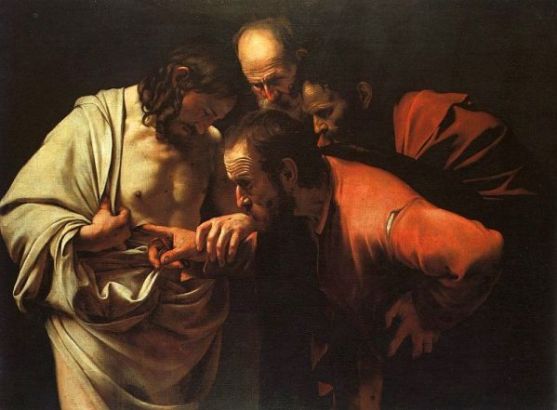For the last 2000 years, Thomas has gotten a bad rap. He’s known as The Doubter—the guy who, when everyone was saying Jesus was alive after his crucifixion, said he wouldn’t believe it unless he could put his fingers into Jesus’ wounds. When we refer to someone as a Doubting Thomas, that’s our modern-day way of saying “Oh ye, of little faith!” But we forget some things about Thomas that might be worth considering…
For one thing, Jesus must have seen something in him because he was, after all, one of the twelve disciples whom he hand-picked to follow him and be part of the revolution of God’s kingdom of love, grace and faith that he came to bring.
For another thing, let’s give the guy a break: everyone else believed after they had seen Jesus raised from the dead. Mary Magdalene was the first one to see him outside the tomb, and even she didn’t realize it was Jesus at first. She thought he was the gardener. It makes you wonder what made her think that. Maybe he had some sort of hood on, or was in a different form. In any case, he’d just been crucified a few days before, so it’s not like she was expecting him to be walking around outside the tomb.
In Luke 24, when Mary and the other women tell the apostles that Jesus has risen, their words were like fairy tales to the apostles (it reads “idle tales” or “nonsense”). They didn’t believe it right away either. In Mark 16, it says plainly (twice in fact) “And when they heard that he was alive and had been seen by her, they did not believe.” (v. 11) and after Jesus appeared to two more people, “They went and told it to the rest, but they did not believe them either.” (v. 13)
Before Jesus was crucified, no one seemed to have a clue what he was talking about half the time or that he was constantly making references to both his death and resurrection. Mostly, they seemed to stand around scratching their heads, perplexed at his way of speaking, his parables and his words. And frankly, so would we. If you read the many incidents of Jesus’ frustration with the fact that people didn’t understand what he was talking about, you’d think he was telling knock-knock jokes rather than proclaiming the Kingdom of God. It must have been hard for him to be around so many people who just didn’t get it. How often do we read him saying, “Oh faithless generation, how long will I have to put up with you?” and “Oh you, of little faith, and slow of heart to believe…”
Apart from Mary Magdalene, the only two people who seemed delirious to know if it might be true that Jesus had risen from the dead were Peter and John. Interesting. John, the one who knew himself to be the beloved and referred to himself as such in the Book of John. And Peter, the one who knew himself to be a royal screw-up in terms of following Jesus, but also knew that the heart of grace that pounded in Jesus’ chest was the heart that loved and forgave him even in the moment that Peter was denying that he ever knew him.
So it wasn’t that the people who believed in Jesus were pious people, or particularly faithful people, or that they always understood what Jesus was talking about. It actually seems the opposite was true. They were more like the opposite of church people. But what they had was that they had encountered Someone in whose presence they felt safe despite their doubts, despite their failings, despite their double-mindedness and despite their foolishness. This must have surprised them as much as it surprised the religious folks who were very interested in making sure people had the correct theology, much like nowadays religious folks are very interested in whether we have the correct theology or politics to go with their version of God. They seem to forget that Jesus himself was an outcast. So naturally, other marginalized people were drawn to him—the poor, lepers, moral failures, tax collectors, women of ill repute, men of questionable integrity (like Judas, who with all his betrayal, was still called to be part of the story).
The people Jesus called might look something like this in today’s world: the homeless who come on trains mumbling and shouting, beggars we step over on our way to buy our groceries, atheists loudly proclaiming their anger at a God who (to them) doesn’t exist, the people hiding under bridges sticking syringes in their arms to cope with life, siblings in prison for narcotics crimes, and maybe even those billionaires who sold out the world economy on Wall Street for their own greed. Yeah, those people. The ones we, of course, are nothing like. We’re not confused, greedy, stingy, morally questionable, depressed, struggling financially, or full of doubts. We are so much better.
And as long as we think that way, it will be very hard to truly see Jesus because then we have lost sight of our own inner poverty and brokenness that is, every moment, in need of God’s grace for each breath, each word and each next action we take. We might then be living out religion, but we won’t be living out God’s love. We won’t see Jesus in those people because we’ll be too busy judging them and feeling superior. And as Mother Teresa said, “When you judge people, you have no time to love them.”
Which brings me back to Thomas and why we should cut him some slack. Something that often goes sadly overlooked is this: when Jesus delayed in going to see Mary and Martha after their brother, Lazarus, had died, the disciples were trying to talk him out of it. They were like, “Whoa, Jesus, you’re going back there, where they just tried to stone you?” And then guess who says this line, “Let us also go to die with him,”? (John 11:16) Yup, Thomas. The guy most people associate with doubt and lack of commitment.
So maybe that’s why Jesus makes a special appearance to say to Thomas, “Hey bro, here I am, believe it or not. Here, stick your finger in my side.” Maybe when Jesus says, “Blessed are those who have not seen and yet have believed,” it’s not just for Thomas. Maybe it’s for all of us because we weren’t there to see him like all of them were. For us to believe takes true faith. If we look at the entirety of the relationship between Jesus and Thomas, including Thomas’ willingness to die with him, we can see the tenderness in Jesus’ words as they drip off the page. He’s not there to beat Thomas up for not believing. He’s there to do what Jesus does best: give grace.
All the other disciples saw him. It was eight days before Thomas got to see him. For eight days, he had to listen to their stories and probably wondered if they were all stark raving mad, or if he was. Maybe Jesus remembered that Thomas was the only one willing to go and die with him long before all the others fled and abandoned him. Maybe Jesus pitied his doubt, but admired his commitment. Maybe he was hurt by Thomas’ unbelief, but respected his honesty about it.
If this day or season of your life is a time where you’re finding it next to impossible to believe in a loving God…if you’re tossed about with doubts while hearing so many voices telling you that they’ve seen him, you’re not alone. Maybe God sees something in you that you don’t even see—honesty, resilience, persistence…and maybe even a glimmer of faith.
If you don’t have a name for it right now, but you really believe that things are going to get better—if you believe that, you have faith, no matter what name or label you put on it, no matter how big or small it is. Even if it’s as small as a mustard seed.
In case no one has ever said this to you: you’re allowed to be where you’re at with your questions.
And if you ask—truly ask—to see him, he will show up for you at a time and in a way you never imagined possible. And he will be peace to you. And he will be grace to you. And you will know he has been there because you will, for once in your life, feel safe and understood and accepted. It’s not that you’ll never doubt again, but your soul will stop its fluttering around and settle within you as a bird settles into its nest and calls it home.


You know, Monique, I don’t encounter many writers that express such a compassionate understanding of the personalities in the New Testament – and even less that dare to see them as Jesus might have. Thanks for sharing these thoughts – it’s the only way for us to understand how to serve one another.
And, yes, those billionaires on Wall Street are magnates for all kinds of ugliness. If we can figure out how to reach them, there’s probably nothing that can stand in love’s way.
LikeLike
What profound and encouraging feedback, Brian. Thank you so much. I will ponder it and treasure it. Blessings to you.
LikeLiked by 1 person